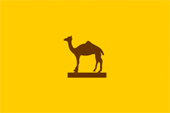Kordofan |
|
|
|
| Übersicht – Contents: | |
Diese Seite ist Teil des Projektes
Kordofan |
|
|
|
| Übersicht – Contents: | |
Flagge – Flag: |
|
 |
Flagge von Kordofan – flag of Kordofan, Seitenverhältnis – ratio = 2:3, Quelle/Source, nach/by: World Statesmen |
Bedeutung/Ursprung der Flagge – Meaning/Origin of the Flag: |
|
| Die Flagge von Kordofan zeigt ein Kamel auf dunkelgelbem Untergrund. Sie ist möglicherweise eine Anspielung auf das alte Kordofan, das vor allem mit der Oase El-Obeid eine wichtige Kreuzung von Karawanenstraßen war. Kordofan war eine der ursprünglichen Provinzen des Sudan. Heute ist sie in drei Provinzen aufgeteilt: Nordkordofan, Westkordofan und Südkordofan. Die Flagge wird noch immer in Nordkordofan verwendet. Das frühere Sultanat hatte wahrscheinlich keine Flagge. | The flag
of Kurdufan shows a camel on a dark yellow background. It may be an allusion
to the Old Kurdufan, which was an important crossroads of caravan routes
mainly by the oasis of El-Obeid. Kurdufan was one of the original provinces of the Sudan. Today it is divided into three provinces: Northern Kurdufan, Western Kurdufan and South Kurdufan. The flag is still used in Northern Kurdufan. The former sultanate probably had no own flag. |
| Quelle/Source: Volker Preuß | |
interaktive Landkarte des Sudan
|
|
Quelle/Source: Freeware, University of Texas Libraries, |
Zahlen und Fakten – Numbers and Facts: |
|
|
|
|
|
|
|
|
|
|
|
|
|
|
|
|
|
Geschichte: |
| Antike ·
Besiedlung durch die Stämm der Tagale und Nuba ca. 600 · Christianisierung 900–1500 · islamisch-arabische Attacken, Islamisierung ca. 1640 · Kordofan wird Teil von Darfur 1650 · Gründung des Sultanats Kordofan unter Sultan Muhammad II. 1779 · Kordofan wird vom Sultanat Sennar erobert und als Provinz angegliedert, Arabisierung 1784 · Kordofan wird vom Sultanat Darfur erobert 1821 · Kordofan wird ägyptische Provinz 1881–1898 · antiägyptisch-klerikaler Mahdiaufstand unter der Führung des Mohammed Achmed, genannt Mahdi, Bildung des Mahdireiches 1883 · Kordofan wird vom expandierenden Mahdi-Staat erobert, und wird zu einem wichtigen Zentrum des Mahdi-Staats 1885 · Tod des Mahdi, Nachfolger wird Chalifa Abdullahi 1898 · Schlacht von Omdurman, Vernichtung des Mahdi-Staats durch britisch-ägyptische Truppen 1899 · Kordofan wird Provinz des Anglo-Ägyptischen Sudan 01.01.1956 · Ägypten und Großbritannien gewähren dem Sudan Unabhängigkeit → Republik Sudan 1994 · Kordofan wird in drei Provinzen aufgeteilt seit 2003 · Konflikte zwischen Arabern und afrikanischen Stämmen im Süden |
History: |
| antiquity
· settlement by the tribes of the Nuba and Tagalog ca. 600 · christianization 900–1500 · Islamic-Arabian attacks, islamization ca. 1640 · Kordofan becomes a part of Darfur 1650 · founding of the Sultanate of Kordofan by Sultan Muhammad II. 1779 · Kordofan is conquered by the Sultanate of Sennar and annexed as a province, arabization 1784 · Kordofan is conquered by the Sultanate of Darfur 1821 · Kordofan becomes an Egyptian provinze 1881–1898 · anti-Egyptian and clerical revolt under the leadership of the Mahdi, Mohammed Ahmed called Mahdi, establish of the the Mahdi empire 1883 · Kordofan is conquered by the expanding Mahdi-Staate, and becomes an important center of the Mahdi State 1885 · Death of the Mahdi, Khalifa Abdullahi succeedes 1898 · battle of Omdurman, destruction of the Mahdi State by british-egyptian troops 1899 · Kordofan becomes a province of the Anglo-Egyptian Sudan 1st of January in 1956 · Egypt and United Kingdom grant independence to Sudan → Republic of Sudan 1994 · Kordofan becomes divided into three provinces since 2003 · conflicts between Arabs and African tribes in the south |
| Quelle/Source: Wikipedia (D), Wikipedia (EN), RetroBib Retrobibliothek |
Ursprung des Landesnamens – Origin of the Country's Name: |
|
| "Kordofan" ist ursprünglich der Name einer Hügelgruppe, die ca. 200 km südlich von El Obeid liegt. In der hier gebräuchlichen Koldagi-Sprache ist das Wort "Kordu" mit "Mann" zu übersetzen. |
"Kordofan" is originally the name of a group of hills, about 200 km in the
south of El Obeid. In the here common Koldagi language is the word "Kurdu"
to translate with "man". |
| Quelle/Source: "Reisen in Nubien, Kordofan, und dem Peträischen Arabien" von Eduard Rüppell, Frankfurt, 1829 | |